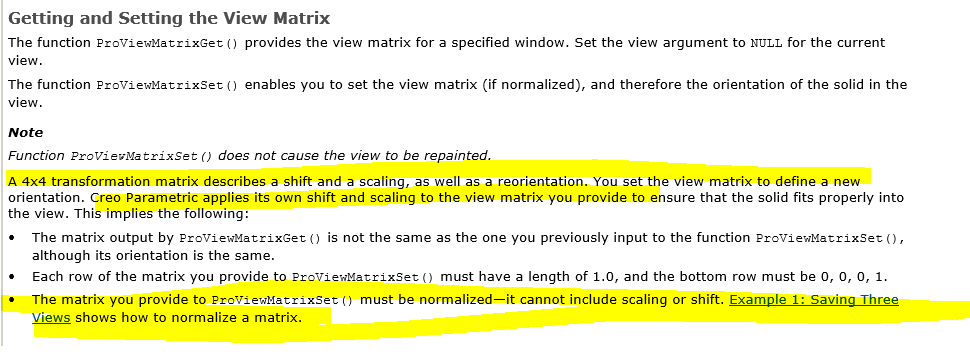Community Tip - Your Friends List is a way to easily have access to the community members that you interact with the most! X
- Community
- Creo+ and Creo Parametric
- Customization
- Re: I can set model view name to drawing view with...
- Subscribe to RSS Feed
- Mark Topic as New
- Mark Topic as Read
- Float this Topic for Current User
- Bookmark
- Subscribe
- Mute
- Printer Friendly Page
I can set model view name to drawing view with ProDrawingViewOrientationFromNameSet but there is no Get API for same. Is there workaround to get it ?
- Mark as New
- Bookmark
- Subscribe
- Mute
- Subscribe to RSS Feed
- Permalink
- Notify Moderator
I can set model view name to drawing view with ProDrawingViewOrientationFromNameSet but there is no Get API for same. Is there workaround to get it ?
can set model view name to drawing view with ProDrawingViewOrientationFromNameSet but there is not Get API for same.
Is there workaround to get it ?
Following code sets model view name
//Get current drawing
ProDrawing model;
result = ProMdlCurrentGet((ProMdl*)&model);
if(result != PRO_TK_NO_ERROR)
{
ProEngineerEnd();
return false;
}
ProMdlName name;
result = ProMdlNameGet(model, name);
ProMdldata data;
result = ProMdlDataGet(model, &data);
ProView view;
result = ProDrawingViewInit(model, 1, &view);
ProName name1;
result=ProDrawingViewNameGet(model, view, name1);
ProMatrix metrix;
result = ProDrawingViewTransformGet(model, view, PRO_B_TRUE, metrix);
if(result==PRO_TK_NO_ERROR)
{
result = ProDrawingViewOrientationFromNameSet(model, view, L"ABC", L"Isometric", 0.0, 0.0);
}
result = ProDrawingViewRegenerate(model, view);
ProDrawingCurrentSheetSet(model, 1);
int iWin;
ProWindowCurrentGet(&iWin);
ProDrawingtreeRefresh(model,iWin);
//Window Refit
ProWindowRefit(iWin);
But how to get Model View name

Solved! Go to Solution.
- Labels:
-
General
Accepted Solutions
- Mark as New
- Bookmark
- Subscribe
- Mute
- Subscribe to RSS Feed
- Permalink
- Notify Moderator
- Mark as New
- Bookmark
- Subscribe
- Mute
- Subscribe to RSS Feed
- Permalink
- Notify Moderator
Hello all,
Suresh,
One of possible workarounds:
get drawing view model with ProDrawingViewSolidGet,
get named views from ProSolid with ProViewNamesGet,
loop through array of view names,
for each view - use ProViewNameToView and ProViewMatrixGet to get model view matrix,
get rid of shift and scale, normalize matrix and compare it to the drawing view matrix.
HIH.
Feliks.
- Mark as New
- Bookmark
- Subscribe
- Mute
- Subscribe to RSS Feed
- Permalink
- Notify Moderator
I am able to that but facing issue in comparing model view matrix with drawing view matrix.
Can you please suggets me how on "get rid of shift and scale, normalize model view matrix"
Thanks,
Suresh
- Mark as New
- Bookmark
- Subscribe
- Mute
- Subscribe to RSS Feed
- Permalink
- Notify Moderator
Here is a snippet from Toolkit User Guide:

- Mark as New
- Bookmark
- Subscribe
- Mute
- Subscribe to RSS Feed
- Permalink
- Notify Moderator
Following method worked for me,
void GetViewOrientationMatrix(ProMatrix viewMatrix, ProMatrix viewOrientMatrix)
ProError status = PRO_TK_NO_ERROR;
ProVector vector1 = {viewMatrix[0][0], viewMatrix[0][1], viewMatrix[0][2]};
ProVector vector2 = {viewMatrix[1][0], viewMatrix[1][1], viewMatrix[1][2]};
ProVector vector3 = {viewMatrix[2][0], viewMatrix[2][1], viewMatrix[2][2]};
viewOrientMatrix[0][0] = vector1[0];
viewOrientMatrix[0][1] = vector1[1];
viewOrientMatrix[0][2] = vector1[2];
viewOrientMatrix[0][3] = 0.0;
viewOrientMatrix[1][0] = vector2[0];
viewOrientMatrix[1][1] = vector2[1];
viewOrientMatrix[1][2] = vector2[2];
viewOrientMatrix[1][3] = 0.0;
viewOrientMatrix[2][0] = vector3[0];
viewOrientMatrix[2][1] = vector3[1];
viewOrientMatrix[2][2] = vector3[2];
viewOrientMatrix[2][3] = 0.0;
viewOrientMatrix[3][0] = 0.0;
viewOrientMatrix[3][1] = 0.0;
viewOrientMatrix[3][2] = 0.0;
viewOrientMatrix[3][3] = 1.0;
double * NormalizeVector(double input[3], double output[3])
double len;
len = VectorLength(input);
if (len < PRO_UTIL_ALMOST_ZERO)
output[0] = input[0];
output[1] = input[1];
output[2] = input[2];
return output;
else
return(VectorScale(1.0/len, input, output));
double VectorLength(double v[3])
return(sqrt(v[0] * v[0] +
v[1] * v[1] +
v[2] * v[2]));
double * VectorScale(double scalar, double vector[3], double result[3])
result[0] = scalar * vector[0];
result[1] = scalar * vector[1];
result[2] = scalar * vector[2];
return(result);
- Mark as New
- Bookmark
- Subscribe
- Mute
- Subscribe to RSS Feed
- Permalink
- Notify Moderator
Some limitations in this workaround:
- ProViewNamesGet() doesn’t return Standard Orientation, so we cannot get the name of Standard Orientation.
- If 2 orientations have the same matrix (i.e. the orientation is the same), we cannot determine which one is actually used. For example, “ABC” and “FRONT” can have same orinetation but with dofferent name.
- It cannot distingush “Isometric” and “Trimetric”.





